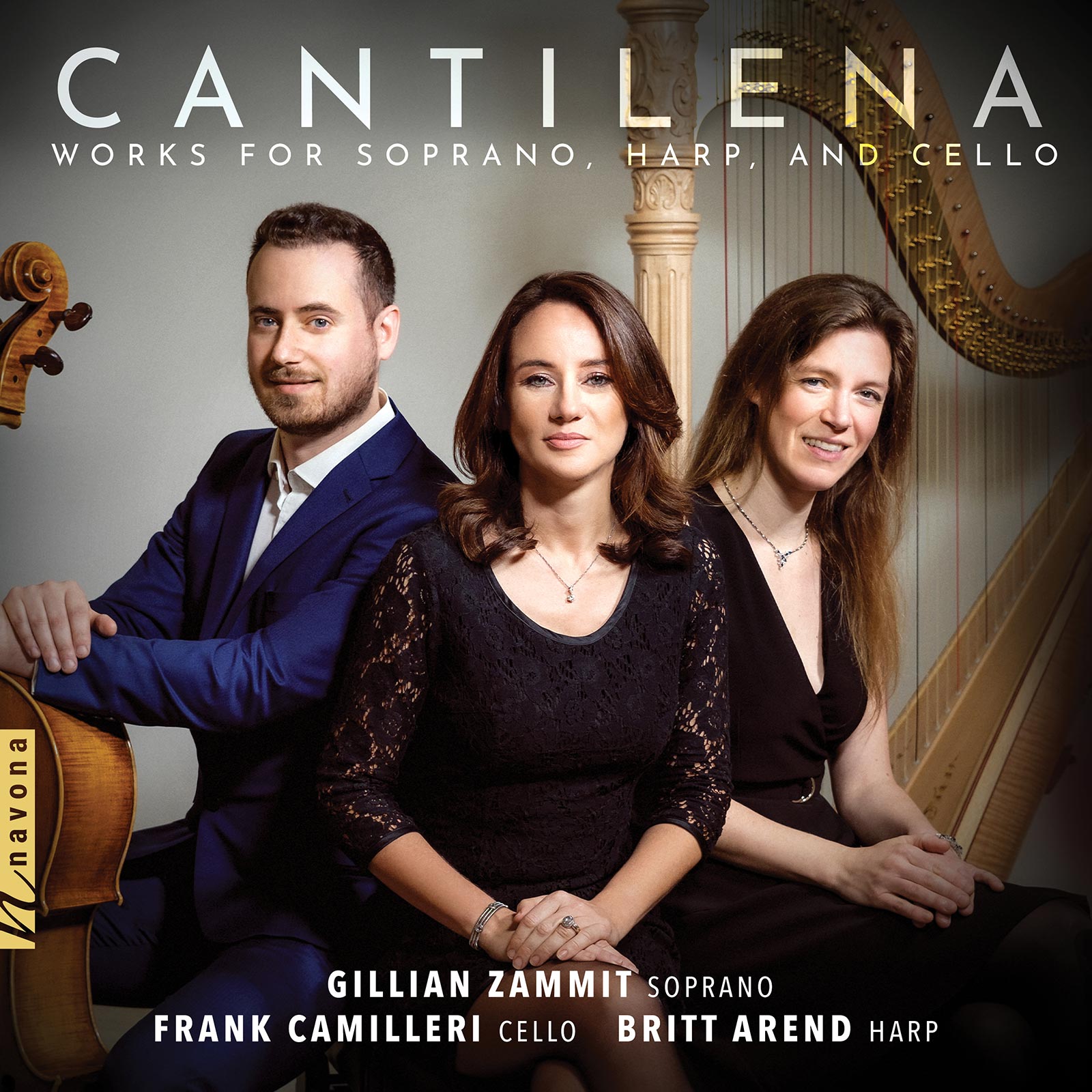
Share Album:
Cantilena
Malta Philharmonic Orchestra Trio
Gillian Zammit soprano
Frank Camilleri cello
Britt Arend harp
Since the late 18th century, art songs have combined poetic vocals and equally intricate instrumental accompaniments to delight listeners with intimate compositions across the globe. The Malta Philharmonic Orchestra Trio’s CANTILENA spans the centuries and continents to highlight the form’s enduring appeal.
CANTILENA transports listeners through time and cultures as soprano Gillian Zammit, harpist Britt Arend, and cellist Frank Camilleri explore the national traditions and stylistic traits of individual composers who embraced the emotional impact and stripped-down arrangement of the art song.
The album opens with works by Debussy, Duparc, Fauré, and Massenet, who exemplify the French penchant for precision and expression in elegant mélodies with accompaniments that shine a light on the emotions expressed in their texts. The lyrical traditions of Italy then come into focus, with folksong-inspired pieces by Tosti featuring beautiful Italianate melodic phrases and a haunting instrumental by Tedeschi. The European tour is concluded with Strauss, with a series of lieder that range from joyous and playful to dark and brooding.
The program takes a contemporary turn with Alexander Vella Gregory’s Tluq, based on poetry by John Aquilina. The short song cycle spans the gamut of human emotion in relationships, beginning with the loss of love and regret to the eventual relief of reconciliation. To close things out, Heitor Villa-Lobos’ Bachianas Brasileiras pays homage to Bach’s Baroque idioms with a heady fusion of Brazilian folk and popular music.
Listen
Stream/Buy
Choose your platform
An Inside Look
Malta Philharmonic Trio - CANTILENA
"It’s an interesting twist on music that one is likely to be fairly (sometimes very) familiar with in the usual voice and piano format"
Track Listing & Credits
| # | Title | Composer | Performer | |
|---|---|---|---|---|
| 01 | Beau soir, L. 6 (Arr. for Soprano & Harp) | Claude Debussy | Gillian Zammit, soprano; Britt Arend, harp | 2:31 |
| 02 | Chanson triste, Op. 2 No. 4 (Arr. for Soprano & Harp) | Henri Duparc | Gillian Zammit, soprano; Britt Arend, harp | 3:19 |
| 03 | 3 Songs, Op. 23 (Arr. for Soprano & Harp): No. 2, Notre amour | Gabriel Fauré | Gillian Zammit, soprano; Britt Arend, harp | 2:01 |
| 04 | Élégie (After Op. 10 No. 5) [Arr. for Soprano, Harp & Cello] | Jules Massenet | Gillian Zammit, soprano; Frank Camilleri, cello; Britt Arend, harp | 3:14 |
| 05 | Pour un baiser! (Arr. for Soprano & Harp) | Francesco Tosti | Gillian Zammit, soprano; Britt Arend, harp | 1:48 |
| 06 | La serenata (Arr. for Soprano & Harp) | Francesco Tosti | Gillian Zammit, soprano; Britt Arend, harp | 2:55 |
| 07 | Sogno (Arr. for Soprano & Harp) | Francesco Tosti | Gillian Zammit, soprano; Britt Arend, harp | 3:33 |
| 08 | Tristezza (Arr. for Soprano & Harp) | Francesco Tosti | Gillian Zammit, soprano; Britt Arend, harp | 3:42 |
| 09 | Elegia, Op. 22 (Arr. for Harp & Cello) | Luigi Maurizio Tedeschi | Frank Camilleri, cello; Britt Arend, harp | 5:56 |
| 10 | 5 Lieder, Op. 48, TrV 202 (Arr. for Soprano & Harp): No. 3, Kling! | Richard Strauss | Gillian Zammit, soprano; Britt Arend, harp | 1:47 |
| 11 | 6 Lieder, Op. 17, TrV 149 (Arr. for Soprano & Harp): No. 3, Das Geheimnis | Richard Strauss | Gillian Zammit, soprano; Britt Arend, harp | 2:24 |
| 12 | Schlichte Weisen, Op. 21, TrV 160 (Arr. for Soprano & Harp): No. 1, All mein Gedanken | Richard Strauss | Gillian Zammit, soprano; Britt Arend, harp | 1:16 |
| 13 | 8 Gedichte aus "Letzte Blätter", Op. 10, TrV 141 (Excerpts Arr. for Soprano & Harp): No. 3, Die Nacht | Richard Strauss | Gillian Zammit, soprano; Britt Arend, harp | 3:18 |
| 14 | 8 Gedichte aus "Letzte Blätter", Op. 10, TrV 141 (Excerpts Arr. for Soprano & Harp): No. 8, Allerseelen | Richard Strauss | Gillian Zammit, soprano; Britt Arend, harp | 3:14 |
| 15 | 4 Lieder, Op. 27, TrV 170 (Arr. for Soprano, Harp & Cello): No. 4, Morgen! | Richard Strauss | Gillian Zammit, soprano; Frank Camilleri, cello; Britt Arend, harp | 4:13 |
| 16 | Tluq (Version for Soprano, Harp & Cello): I. Vistu | Alex Vella Gregory | Gillian Zammit, soprano; Frank Camilleri, cello; Britt Arend, harp | 2:54 |
| 17 | Tluq (Version for Soprano, Harp & Cello): II. Ma Ħallejt Xejn Warajk | Alex Vella Gregory | Gillian Zammit, soprano; Frank Camilleri, cello; Britt Arend, harp | 3:01 |
| 18 | Tluq (Version for Soprano, Harp & Cello): III. Meta Titgħallem Titlaq | Alex Vella Gregory | Gillian Zammit, soprano; Frank Camilleri, cello; Britt Arend, harp | 3:29 |
| 19 | Bachianas brasileiras No. 5, W389 (Arr. for Soprano, Harp & Cello): I. Ária. Cantilena | Heitor Villa-lobos | Gillian Zammit, soprano; Frank Camilleri, cello; Britt Arend, harp | 5:09 |
Recorded October 26 - 28, 2019 at Blagoje Bersa Concert Hall, Zagreb, Croatia
Recording Session Producer Krešimir Seletković
Recording Session Engineer Jan Košulič
Cover photo Brian Grech
Executive Producer Bob Lord
Executive A&R Sam Renshaw
A&R Director Brandon MacNeil
VP, Audio Production Jeff LeRoy
Recording Sessions Director Levi Brown
International Recording Sessions Manager, Editing, Mixing & Mastering Jan Košulič
Audio Director Lucas Paquette
VP, Design & Marketing Brett Picknell
Art Director Ryan Harrison
Design Edward A. Fleming
Publicity Patrick Niland, Sara Warner
Artist Information

Malta Philharmonic Orchestra Trio
Gillian Zammit is a versatile soprano with a varied repertoire, who trained with Carlo Bergonzi and Victoria de los Angeles. Opera productions include The Turn of The Screw, Rigoletto, Die Zauberflote, and Orphée et Eurydice. She has performed with Joseph Calleja, Andrea Bocelli, Eugene Kohn, and Emma Kirkby among others.
Notes
Art songs” — musical settings of poetry for solo voice and instrumental accompaniment – are a musical form which blossomed from the late 18th Century onwards. German lieder are widely considered to be the quintessential expression of this genre, so much so that the term lieder is sometimes used, misleadingly, to refer to similar works in other languages. In reality, the art song is a variegated form encompassing various national traditions and stylistic traits of individual composers. The choice of pieces in this program is a testament to the genre’s diversity.
The early songs of CLAUDE DEBUSSY (Saint-Germain-en-Laye, 1862 – Paris, 1918) are written in the mould of French mélodies – elegant pieces in which texts, generally love poems, were set to attractive tunes with relatively simple piano accompaniment. Beau Soir [1], one of his teenage compositions, is an evocation of the day’s end. Paul Bourget’s poem compares the coming night to the approach of death and the music suitably rises to a climax before subsiding to a hushed close.
Debussy held that “clarity of expression, precision and concentration of form are qualities peculiar to the French genius.” These traits can be discerned in the mélodies which follow. Chanson Triste [2], a setting of a poem by Jean Lahor, is one of 17 songs by HENRI DUPARC (Paris, 1848 – Mont-de-Marsan, 1933). An early work (subsequently heavily revised), it shows the influence of another French master – Charles Gounod. Gabriel Fauré (Pamiers, 1845 – Paris, 1894) set Armand Silvestre’s Notre Amour [3] in 1879. In around two minutes, the composer condenses five verses of playful text, subtly underlining the progressive deepening of the poet’s love from légère in the first verse to éternelle in the last. Élégie [4] by JULES MASSENET (Montaud, 1842 – Paris, 1912) is an arrangement of the “Invocation” from the composer’s incidental music for the play Les Érinnyes.
A native of Abruzzo, FRANCESCO TOSTI (Ortona, 1846 - Rome, 1916) soaked up the rich lyrical traditions of his country. Musical studies in Naples gave Tosti a good technical preparation, but he also drew inspiration from the vernacular styles he encountered while collecting, editing, and arranging Italian folksongs. Tosti remains best known for his “salon pieces”: melodious ballads which became all the rage in Europe and were subsequently recorded by operatic stars such as Jüssi Bjorling and Nellie Melba and, intriguingly, by the world’s last “castrato” Alessandro Moreschi.
Tosti is represented here by four songs which span his career. Pour un Baiser! [5] is a 1904 setting of a poem by George Doncieux. An expression of the poet’s yearning for his lover, it is typical of the texts set by Tosti, with their fin-de-siècle mix of passion, melancholy, and, occasionally, sentimental religiosity. La Serenata [6], composed in 1888 to words by Giovanni Alfredo Cesareo, is a moonlit vignette portraying the narrator’s sleeping lover caressed by song. Sogno [7] sets a poem by Lorenzo Stecchetti describing a passionate dream in which the narrator fervently prays to overcome the pangs of desire. Tristezza [8], dating from 1908, is a relatively late work. The valedictory text by Riccardo Mazzoli expresses a lover’s distress at the thought of losing the idyll he is living. Cello and harp provide a haunting instrumental coda to this Tosti selection – the Elegia [9] by LUIGI MAURIZIO TEDESCHI (Turin, 1867 – Cairate, 1944), one of the leading concert harpists of his time.
It is tempting to consider RICHARD STRAUSS (Munich, Germany 1864 – Garmisch-Partenkirchen, Germany 1949) as primarily a composer of opera and large-scale orchestral works. However, he also wrote more intimate works. In particular, Strauss was a prolific lieder composer. He wrote his first songs at just 6 years of age and his last completed composition was a lied for voice and piano, Malven.
Kling! [10] represents the joyful outpouring of a heart full of hope. It is the third of the 5 Lieder Op. 58, which Strauss published in 1900, setting poems by Karl Henckell. Das Geheimnis [11] is taken from a set of six lieder to texts by Adolf von Schack. The pastoral imagery of the poem is gently conveyed in playful music. All Mein Gedanken [12] is a love song which opens Schlichte Weisen Op. 21, a set of five songs dating from 1890. The song’s light-hearted tone contrasts with the darker atmosphere of Die Nacht [13] and Allerseelen [14]. Both songs are taken from Strauss’s Opus 10, the first collection of songs which the composer ever published, based on poems by Hermann von Gilm. Strauss met John Henry McKay in Berlin and subsequently used his poems for some of his songs, including Morgen! [15]. It closes the composer’s four Lieder Opus 27 and was conceived as a wedding present to his wife, the soprano Pauline de Ahna.
Like the Romantics, contemporary composers continue to be inspired by the literature of their time. Tluq by ALEX VELLA GREGORY (b. 1984) is a short song cycle based on recent poetry by John Aquilina who, like the composer, hails from Malta. It speaks of loss of love, regret, loneliness, and eventual reconciliation. The anguished music of Vistu (“Mourning”) [16] is dramatic, almost half-way between aria and recitative, reflecting the protagonist’s physical and emotional loss. The same atmosphere permeates Ma Ħallejt Xejn Warajk (“You Left Nothing Behind”) [17]. This song is a passacaglia built on a mournful ground bass whose repetitions convey a sense of hopelessness. The cycle ends with Meta Titgħallem Titlaq (When You Learn to Depart) [18], a poem which expresses themes of hope and reconciliation. The music mirrors the words through gently oscillating chords and a more lyrical melodic line, ending the cycle on a more positive note.
The nine suites of Bachianas Brasileiras by HEITOR VILLA-LOBOS (Rio de Janeiro, 1887 – Rio de Janeiro, 1959) present a heady fusion of styles, combining Brazilian folk and popular music and Baroque idioms, hence the tribute to Johann Sebastian Bach in their title. Cantilena [19] is the first movement of the fifth suite, here performed in an arrangement for soprano, harp, and cello.
